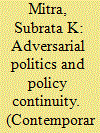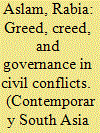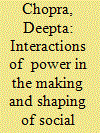|
|
|
Sort Order |
|
|
|
Items / Page
|
|
|
|
|
|
|
| Srl | Item |
| 1 |
ID:
106719


|
|
|
|
|
| Publication |
2011.
|
| Summary/Abstract |
The article seeks to explain the resilience of India's democracy in terms of the persistence of significant legislative output and policy continuity despite noisy adversarial politics. The article analyses this argument on the basis of a comparison of two different national regimes - one by the BJP-led National Democratic Alliance government (NDA), 1999-2004, and the other by the Congress-led United Progressive Alliance (UPA), 2004-2009. Despite their rather different approaches to citizenship - the former, based on Hindu nationalism, and the latter, a more inclusive, 'secular' conception of citizenship - there is considerable convergence in legislative regimes, institutions to safeguard the interest of minorities and public subsidy for the Haj pilgrimage. Turning subjects into citizens - no doubt with a sharp eye to their electoral potential - has become accepted practice by both competing coalitions. Despite its occasional breakdown, the paradoxical juxtaposition of adversarial politics and policy continuity is achieved because of the existence of a broad inter-party consensus on one coherent and meaningful citizenship regime and the high trust in which mediating institutions like the Supreme Court and the Election Commission are held.
|
|
|
|
|
|
|
|
|
|
|
|
|
|
|
|
| 2 |
ID:
106717


|
|
|
|
|
| Publication |
2011.
|
| Summary/Abstract |
This article explores the significance of the ninth parliamentary election, held in December 2008, for democratic consolidation in Bangladesh. Three factors have made the ninth election important: first, it was held after two years of military-backed civilian caretaker rule when the government had adopted several measures for electoral and political reforms; second, the main parties formed pre-election alliances to face each other, rather than contesting the election on an individual basis, as was the practice in the past; and third, the composition of the electorate changed significantly, with nearly one-third of the voters casting votes for the first time. The use of a foolproof electoral roll also made the election results credible. Unlike the past, no major case of election rigging has been reported to the Election Commission after the elections. Nor did those losing the elections reject the results outright. The government also initially adopted a policy of inclusion, creating some space for the opposition to be proactive, and the opposition reciprocated by attending the inaugural session of the ninth parliament and pledging to make the parliament effective. The article explores the significance of this change in attitude as well as different electoral reforms for democratic consolidation in the country.
|
|
|
|
|
|
|
|
|
|
|
|
|
|
|
|
| 3 |
ID:
106720


|
|
|
|
|
| Publication |
2011.
|
| Summary/Abstract |
The Baloch nationalists have been actively involved in an armed struggle against the government of Pakistan during the last decade. Indeed, the recent risk assessment report produced by the Minorities at Risk Project places the Baloch population at a high risk for future rebellion. A detailed analysis of the ongoing conflict reveals that in addition to the classic greed- and grievance-based explanations, poor governance resulting from the ongoing plunder of Balochistan's natural resources and its economic and political marginalization has been a major cause of mounting tension between the Baloch people and the government of Pakistan. The presence of insurgent groups and the continuation of violent conflict in neighboring Afghanistan might lead to further instability in Balochistan. The government of Pakistan therefore seriously needs to reform its strategy and address the issues that have lead to the escalation of the conflict under discussion during the last decade.
|
|
|
|
|
|
|
|
|
|
|
|
|
|
|
|
| 4 |
ID:
106718


|
|
|
|
|
| Publication |
2011.
|
| Summary/Abstract |
This paper focuses on the interactions of power as analysed through the formulation story of a recently enacted social policy, the National Rural Employment Guarantee Act (NREGA), India. It explains the various drivers that led to the passing of this policy, with a view to analysing the extent and nature of power as was played out in the making of this policy. The paper sets out the way in which social policy formulation can be understood to be arising from interactions and linkages between individual actors, who together make up policy coalitions and networks. These interactions are described through a four-fold classification of processes (parliamentary, executive, party political and civil society) into which the actions and contributions of these actors feed, giving rise to an iterative, messy and complex reality. Power in the policy formulation network is shown as multi-sited as well as relational. The paper concludes with an endorsement for reconfiguring the geographies of power in the form of a kaleidoscope of actors and events, within and through which power flows and is exercised.
|
|
|
|
|
|
|
|
|
|
|
|
|
|
|
|
| 5 |
ID:
106721


|
|
|
|
|
| Publication |
2011.
|
| Summary/Abstract |
Economic growth at the national level in Sri Lanka in the past few years has been largely state-led. Similarly, economic growth in the formerly civil war-affected northern province has also been largely state-led (including mushrooming military enterprises) during the past two years after the end of the civil war. This author is of the view that individual and corporate entrepreneur-led growth strategy is the appropriate strategy to revive the national economy and the formerly war-torn regional economies. Moreover, current military peace should be transformed into civil peace in the former war-torn areas.
|
|
|
|
|
|
|
|
|
|
|
|
|
|
|
|
| 6 |
ID:
106716


|
|
|
|
|
| Publication |
2011.
|
| Summary/Abstract |
During the 2000s, confirmed polio cases in India have been increasingly localised in Uttar Pradesh (UP) and Bihar, especially amongst Muslim children. Muslims have also been at the sharp end of the Pulse Polio Initiative (PPI) and the associated 'Underserved Strategy' designed to counter civilian resistance to the programme. Our critique of the PPI draws on long-term research in rural UP and focuses on the programme's socio-political implications. We discuss popular rumours about polio vaccine and official responses to resistance. Taking a longer term view of top-down single-issue public health programmes, we argue that Muslims in western UP, as a marginalised minority, have good reason to be suspicious of the PPI. Moreover, the PPI arguably reflects the agendas of global funders, not the priorities of local communities. Villagers - Hindu and Muslim alike - have repeatedly criticised government health services for failing to deal with the health issues that worry them most. Their concerns echo other critiques of the PPI, particularly the diversion of resources from other health-related activities that could address the social determinants of health and health inequalities.
|
|
|
|
|
|
|
|
|
|
|
|
|
|
|
|
|
|
|
|
|